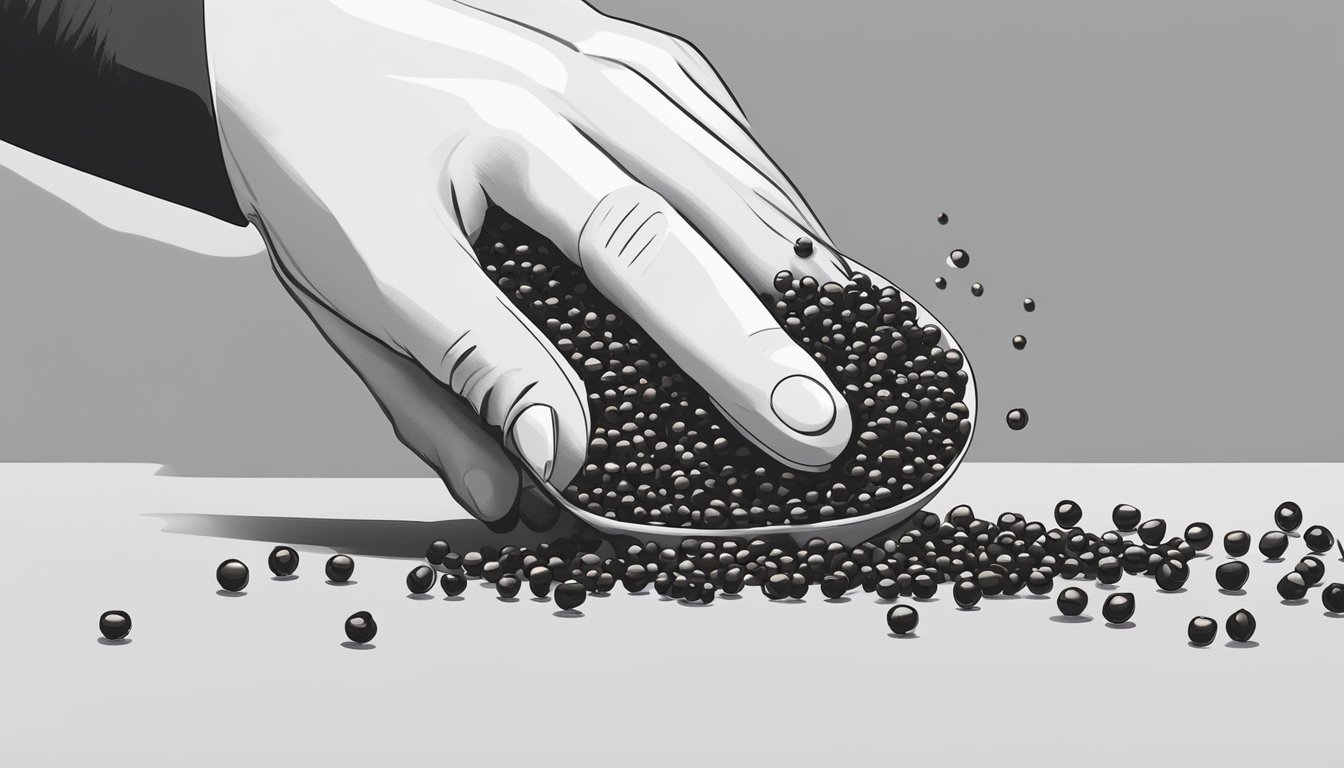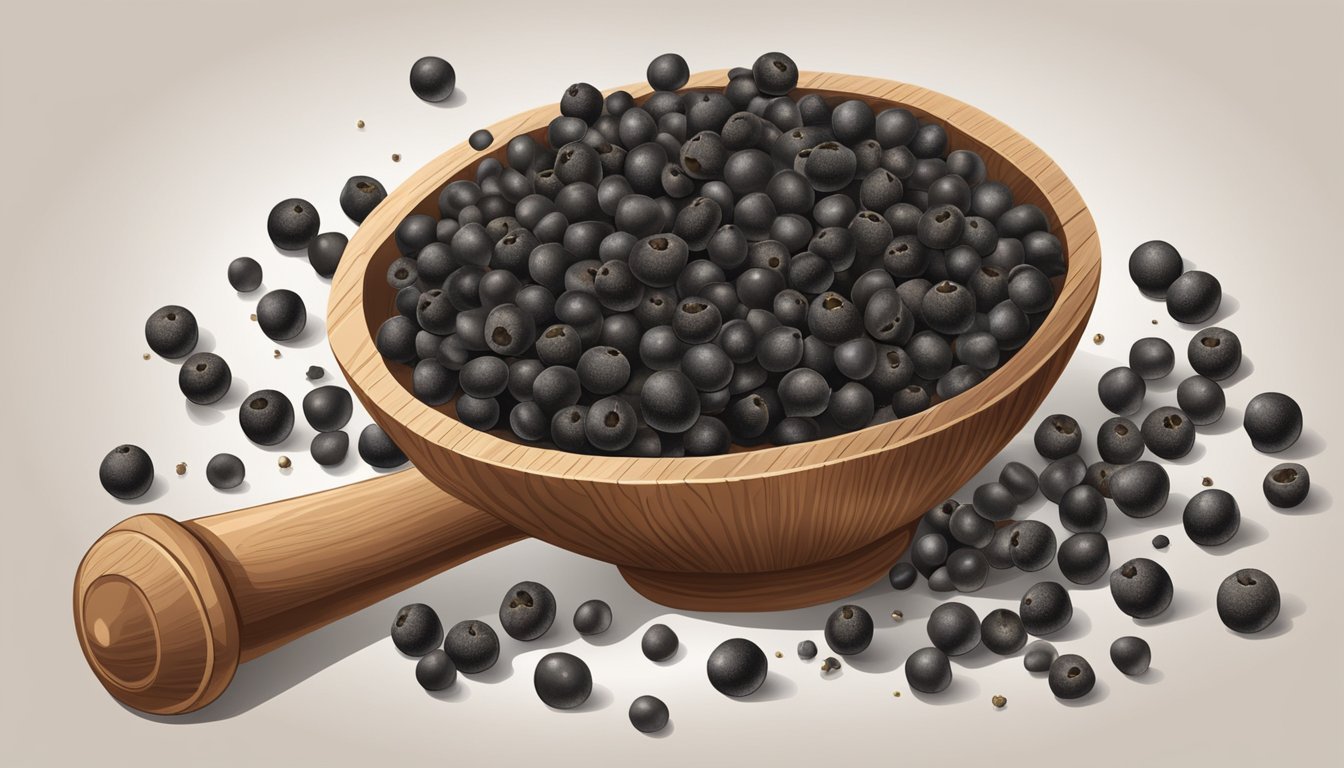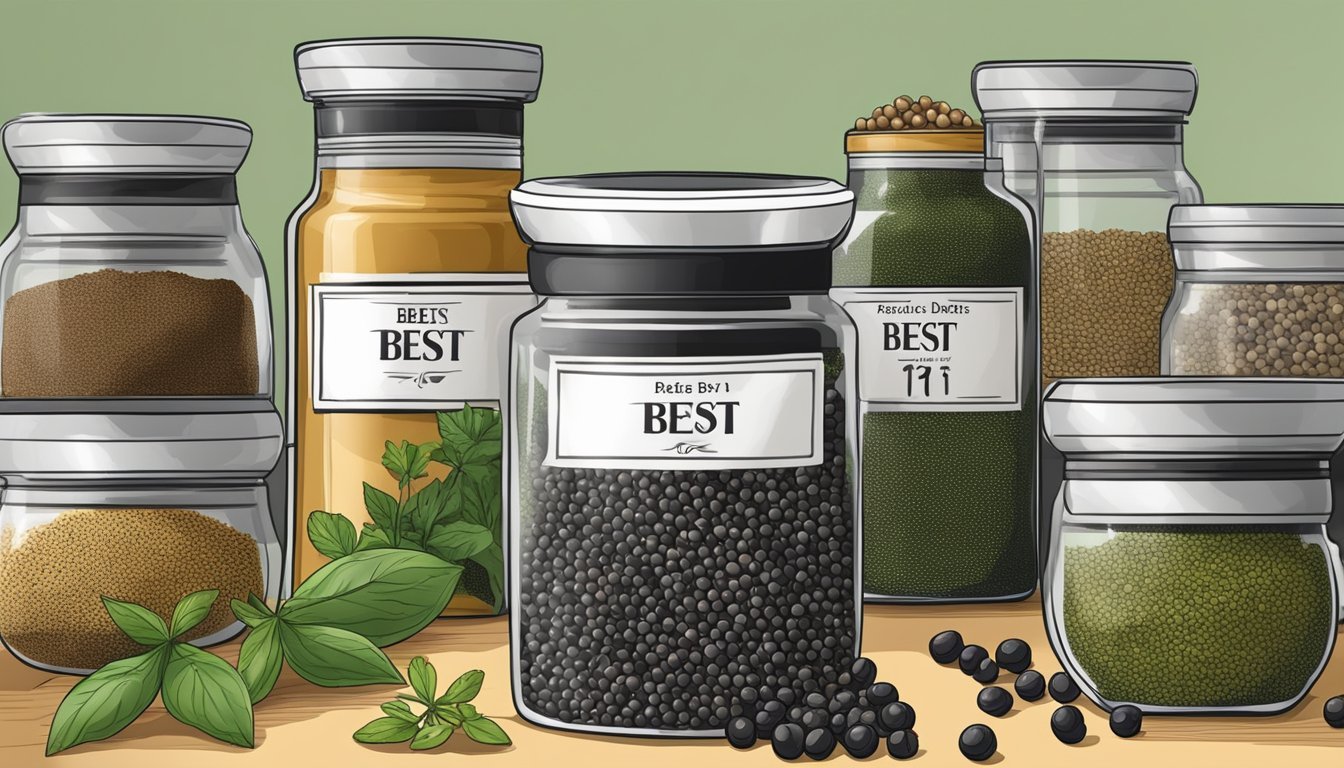How Long Do Black Peppercorns Last?
Shelf Life and Storage Tips
Black peppercorns, the dried fruit (how long does dried fruit last?) of the Piper nigrum plant, are a staple in kitchens worldwide, treasured for their pungent flavor and versatility in culinary applications. When stored properly, whole peppercorns maintain their quality and potency markedly longer than their ground counterparts. The key to their longevity lies in the integrity of their outer shell, which protects the inner seed from exposure to environmental factors that can lead to flavor and aroma degradation.
The shelf life of whole black peppercorns can extend up to three to four years when kept in optimal conditions. For maximal preservation, storage should be in airtight containers placed in a cool, dark environment. This limits the exposure to air and light, both of which can diminish the essential oils that give peppercorns their characteristic spicy taste. Ground black pepper, on the other hand, typically retains its peak quality for about a year, as the grinding process increases surface area and accelerates the loss of flavor.
Understanding Peppercorns
Peppercorns are a staple in cuisines worldwide, prized for their ability to add both heat and depth to dishes. They come in various types, each with unique characteristics, and are composed of elements that contribute to their distinct flavor profiles.
Types of Peppercorns
Black Peppercorns: The most common type, they are actually green peppercorns that have been cooked and dried, gaining a sharp, pungent flavor. Black pepper contains piperine, the compound responsible for its spicy quality.
White Peppercorns (how long do white peppercorns last?): These are mature black peppercorns which have had the outer skin removed, resulting in a milder flavor that is often used in light-colored dishes to maintain visual appeal.
Green Peppercorns: Harvested before they mature, green peppercorns are milder than black peppercorns and are often used in French and Thai cuisine.
Red Peppercorns (how long does red peppercorns last?): Typically, these are the ripest form of peppercorn and can be found dried or in brine, offering a sweet and spicy flavor.
Peppercorn Composition
Peppercorns, whether whole or ground, contain essential oils and volatile aromas that contribute to their distinct flavors. Grinding peppercorns into powder increases their surface area, intensifying flavor but also accelerating flavor loss over time due to increased exposure to air. Whole peppercorns, on the other hand, maintain their flavor longer as the essential oils are preserved within the outer layer until they are ground.
Shelf Life Fundamentals
When considering the longevity of black peppercorns, it is essential to understand that their shelf life can be influenced by various factors, ranging from the form in which they are used (whole or ground) to how they are stored. The freshness, potency, and aroma of the peppercorns are dependent on these elements, which ultimately affect the quality of the spice.
Factors Affecting Shelf Life
The shelf life of black peppercorns is primarily affected by exposure to air, light, and heat. Oils within the peppercorns, responsible for their aroma and taste, can deteriorate when exposed to these elements. Maintaining optimal storage conditions—in a cool, dark, and dry place—can extend their shelf life. Containers with tight-fitting lids are recommended to shield the peppercorns from air and moisture.
Whole vs Ground Peppercorns
Whole Peppercorns: Typically last longer, retaining freshness and potency for about 3 to 4 years due to their minimal surface exposure, which protects the essential oils inside.
Ground Pepper: Loses its flavor and aroma at an accelerated pace, often within 6 months to a year, as the increased surface area promotes faster oil evaporation and taste degradation.
Expiration Date Considerations
While expiration dates are indicators of freshness, black peppercorns may retain quality past the noted date. One should consider these dates as a guide rather than an absolute rule; the actual potency and flavor can be gauged by the peppercorn's aroma and taste upon use. Whole peppercorns typically do not spoil, but they do lose aroma and color over time, impacting culinary applications.
Proper Storage Techniques
Proper storage techniques are crucial to maintaining the potency and flavor of black peppercorns. Ensuring they are shielded from elements that hasten deterioration will prolong their life span.
Selecting the Right Containers
When storing black peppercorns, one must select airtight containers that prevent moisture and air from entering. The ideal choices are glass or metal containers with tight-sealing lids. Resealable plastic bags can also suffice for shorter-term storage, but they're not as effective against strong odors and possible punctures.
Ideal Storage Conditions
Black peppercorns retain their quality best when stored in a cool, dry place away from sunlight. A pantry or cupboard away from heat sources, like the stove or oven, is suitable. To avoid humidity and temperature fluctuations, it's recommended to avoid placing them near the dishwasher or refrigerator. The optimal conditions include a consistent room temperature and low humidity.
Common Storage Mistakes
Storing black peppercorns improperly can lead to a quick decline in flavor. They should not be stored above the stove or in a spice rack exposed to daily kitchen activity, as the heat and light will degrade them. Keeping peppercorns in the refrigerator or freezer is not necessary and can introduce unwanted moisture. Always keep the container tightly sealed after each use to protect against environmental factors.
Assessing Peppercorns Quality
When assessing the quality of peppercorns, one should perform a sensory evaluation and check for any signs of spoilage. These methods enable the detection of any dips in quality or the presence of spoilage without relying solely on the expiration date.
Sensory Evaluation
Aroma: The aroma should be sharp and penetrating. Fresh peppercorns release a pungent scent that might be described as both hot and somewhat earthy. One can test this by crushing a few peppercorns—fresh peppercorns will exude a robust and unmistakable smell.
Flavor: When tasted, high-quality peppercorns should impart a sharp, warm, slightly sweet flavor profile that is a hallmark of their freshness. Dried peppercorns that are still potent will have a strong taste when chewed or ground.
Color: The color of fresh whole black peppercorns should be uniformly dark and slightly shiny. They should not have a bleached appearance or visible spots that deviate from their natural deep black or brown coloration.
Signs of Spoilage
Mold: One should inspect for any signs of mold or mildew if the peppercorns have been exposed to moisture. The presence of mold is characterized by a distinct change in texture and color, indicating spoilage.
Texture: Peppercorns should be hard to the touch. If they feel soft or have a spongy texture, this likely means they have absorbed too much moisture and may be compromised.
It is essential for one to trust their senses when evaluating peppercorns. While they do not spoil in a way that makes them unsafe to consume, their sensory qualities diminish over time, which can significantly alter the intended flavor profile of a dish.
Maximizing Peppercorns Usage
To make the most of whole black peppercorns, one must understand their application in cooking and how they harmonize with other spices. Strategic use enhances dishes by unlocking the full potential of their intricate flavors.
Incorporating into Cooking
Whole black peppercorns offer a pungent kick and should be ground fresh using a pepper mill to maintain their aromatic oils. When cooking various recipes, freshly ground peppercorns are superior to pre-ground pepper in imparting vibrant complexity to sauces, salads, meat dishes, and soups. Before adding to dishes, crushing them slightly releases the essential oils, heightening the flavor profile.
Grinding: Always grind peppercorns just before use to ensure the highest flavor potency in cooking.
Recipes: Incorporate ground peppercorns in marinades and rubs to infuse meat with depth and zing.
Pairing with Other Spices
Peppercorns excel when paired with complementary spices. For instance, combining them with cinnamon and salt can bring a savory-sweet balance to dried fruit-infused dishes. When creating blends, one should consider the flavor profiles of other herbs and spices to achieve a harmonious mix.
Complementary Pairing:
Salt: Enhances peppercorn's natural bite and can intensify the other flavors within a dish.
Cinnamon: Offers a warm, sweet contrast to peppercorn’s sharpness, suitable for autumnal recipes.
By mindfully grinding peppercorns and thoughtfully pairing them with suitable spices and herbs, their usage in the kitchen can be maximized, thereby enriching the overall flavor of culinary creations.
Special Considerations
When considering how long peppercorns last, one needs to take into account the variety and storage methods. Varieties differ in shelf life and flavor, while proper storage is crucial to maintaining potency.
Peppercorn Varieties and Their Shelf Life
Black Peppercorns: Traditional black peppercorns last about 3 to 4 years when stored properly in a cool, dark place. They contain essential oils that give them their aromatic scent and health benefits, but these oils deteriorate over time.
White Peppercorns: These are black peppercorns stripped of their skin and have a slightly different, milder taste. Their shelf life is comparable to black peppercorns, lasting around 3 to 4 years under ideal conditions.
Green Peppercorns: These immature peppercorns can be found dried or brined and often have a more subtle, fresher flavor. Dried green peppercorns share a similar shelf life with black and white varieties, while brined or water-packed ones should be used within a few weeks once opened, and can generally last up to a year unopened in the refrigerator.
Red Peppercorns: Often the rarest, these are fully ripe peppercorns and possess a fruitier flavor. They should be consumed relatively soon after purchase to enjoy their full flavor profile. Unlike their dried counterparts, red peppercorns do not have a long shelf life.
Extended Storage Solutions
To maximize the shelf life and flavor retention of peppercorns:
Buy in small quantities: This ensures that peppercorns are used within their flavor peak.
Keep containers sealed: Store peppercorns in airtight containers to protect them from humidity and contaminants.
Avoid light and heat: Store peppercorns in a cool, dark cupboard away from direct sunlight and heat sources which can accelerate loss of flavor.
Consider the freezer: For extended storage beyond the typical shelf life, one can freeze peppercorns to help preserve the essential oils and potential health benefits. However, freezing might not significantly extend the life of ground pepper due to the exposure of more surface area to the elements, leading to a faster deterioration of flavor and aroma.








